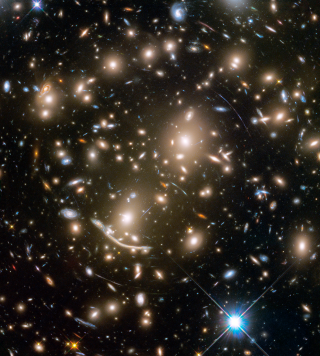Bibcode
DOI
Arnaboldi, Magda; Doherty, Michelle; Gerhard, Ortwin; Ciardullo, Robin; Aguerri, J. Alfonso L.; Feldmeier, John J.; Freeman, Kenneth C.; Jacoby, George H.
Referencia bibliográfica
The Astrophysical Journal, Volume 674, Issue 1, pp. L17-L20.
Fecha de publicación:
2
2008
Revista
Número de citas
18
Número de citas referidas
12
Descripción
The line-of-sight velocities and [O III] 5007 Å expansion
velocities are measured for 11 planetary nebulae (PNs) in the Virgo
Cluster core, at 15 Mpc distance, with the FLAMES spectrograph on the
ESO VLT. These PNs are located about halfway between the two giant
elliptical galaxies M87 and M86. From the [O III] 5007 Å line
profile widths, the average half-width at half-maximum expansion
velocity for this sample of 11 PNs is v¯HWHM=16.5 km
s-1 (rms=2.6 km s-1). We use the PN subsample
bound to M87 to remove the distance uncertainties and the resulting [O
III] 5007 Å luminosities to derive the central star masses. We
find these masses to be at least 0.6 Msolar and obtain PN
observable lifetimes tPN<2000 yr, which imply that the
bright PNs detected in the Virgo Cluster core are compact, high-density
nebulae. We finally discuss several scenarios for explaining the high
central star masses in these bright M87 halo PNs.
Proyectos relacionados

Evolución de Galaxias en Cúmulos
Las estructuras en el Universo, a todas las escalas de masa, se han formado de una forma jerárquica y principalmente producidas por fusiones de galaxias. Sin embargo, esta formación jerárquica de las galaxias está modulada por el entorno en el cual se crean y evolucionan. Mientras que las galaxias de campo presentan una evolución pasiva, los
Jairo
Méndez Abreu